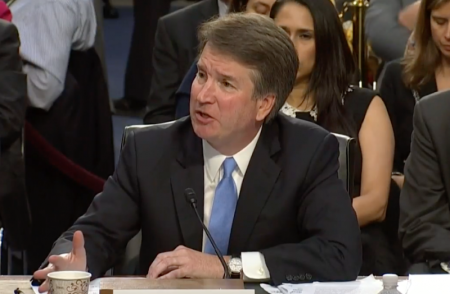Kavanaugh Says Gov't Can't Force Christian Groups to Pay for Abortion Drugs

U.S. Supreme Court nominee Brett Kavanaugh has stated that the federal government cannot compel Christian organizations to provide coverage for abortion-inducing drugs.
Senator Ted Cruz, R-Texas, asked Kavanaugh on Thursday during a Senate hearing about the case Priests for Life et al. v. United States Department of Health and Human Services.
Kavanaugh, a member of the U.S. Court of Appeals for the District of Columbia Circuit, had authored a dissent against the court's decision to reject Priests for Life's petition for an appeal. He explained during the hearing why he supported the group Priests for Life's argument that the HHS preventive services mandate violated their religious liberty.
"Under the Religious Freedom Restoration Act, the question was first was this a substantial burden on their religious exercise, and it seemed to me quite clearly it was," said Kavanaugh, who was nominated by President Donald Trump in July to replace the retired Justice Anthony Kennedy.
"It was a technical matter of filling out a form in that case, but they said filling out a form would make them complicit in the provision of the abortion-inducing drugs they were, as a religious manner, objected to."
Kavanaugh noted that it "seemed to me that the government had avenues to ensure that the coverage was provided without doing so on the backs of the religious objectors."
His choice of the words "abortion-inducing drugs" riled up abortion activists, who argue that contraception "prevents" pregnancy rather than terminates it.
NARAL Pro-Choice America tweeted, "Kavanaugh just referred to birth control as 'abortion-inducing drugs,' which is not only an anti-science lie, it's an anti-choice extremist phrase that shows that our right to access both abortion and contraception would be in SERIOUS danger if he is confirmed. #StopKavanaugh."
But pro-life advocates have long maintained that certain contraceptive drugs, such as Ella, do cause abortions.
"If a woman takes RU-486 or Ella and hasn't released an egg, it can delay egg release. If a woman takes RU-486 or Ella after she releases an egg, however, it can cause the embryo to die ... The evidence that Ella can kill embryos, even after they have implanted, comes from the research submitted to the FDA when Ella was being considered for approval," Donna Harrison, executive director and director of research and public policy for the American Association of Pro-Life Obstetricians and Gynecologists, has maintained.
Meanwhile, Father Frank Pavone, national director of Priests for Life, said the dispute over terminology is a "distraction from the main point."
The main point, he said, is that "the law must protect citizen's rights to live their sincerely held religious beliefs, no matter what terminology they use in expressing those beliefs. Judge Kavanaugh completely understands the distinction between contraception and 'abortion-inducing drugs' and knows that some redefine pregnancy as beginning at implantation rather than fertilization.
"Be that as it may. What Judge Kavanaugh also understands, and many of his objectors do not, is that it is not the role of the Court to judge the accuracy or credibility of a citizen's religious beliefs, but to protect the citizens' freedom to hold and live those beliefs. That is what he did in the Priests for Life case, and that is one of the countless reasons he should be confirmed to the Supreme Court."
During Thursday's hearing, Kavanaugh stressed that "religious liberty protects all of us" and went on to note the value of the federal Religious Freedom Restoration Act, calling it "an important addition to the protection of religious freedom in the United States, to supplement the constitutional protections that exists in the Free Exercise Clause."
He talked about other cases he was involved in, including fighting for the rights of a student religious group to meet at a public school after class.
He also stated that he believed "it's important to recognize that the Constitution, the First Amendment of the Constitution, as well as many statutes of course, protect religious liberty in the United States."
"And as I have said in some of my opinions, we're all equally American no matter what religion we are or no religion at all," Kavanaugh added.
The Senate Judiciary Committee began their hearing on Kavanaugh on Tuesday.
The proceedings have been marked with controversy, as Senate Democrats have denounced what they believe to be a lack of transparency on the part of Republican leadership.
In addition to these protestations, the hearing has been interrupted dozens of times by heckling demonstrators who strongly oppose Kavanaugh's confirmation.





















